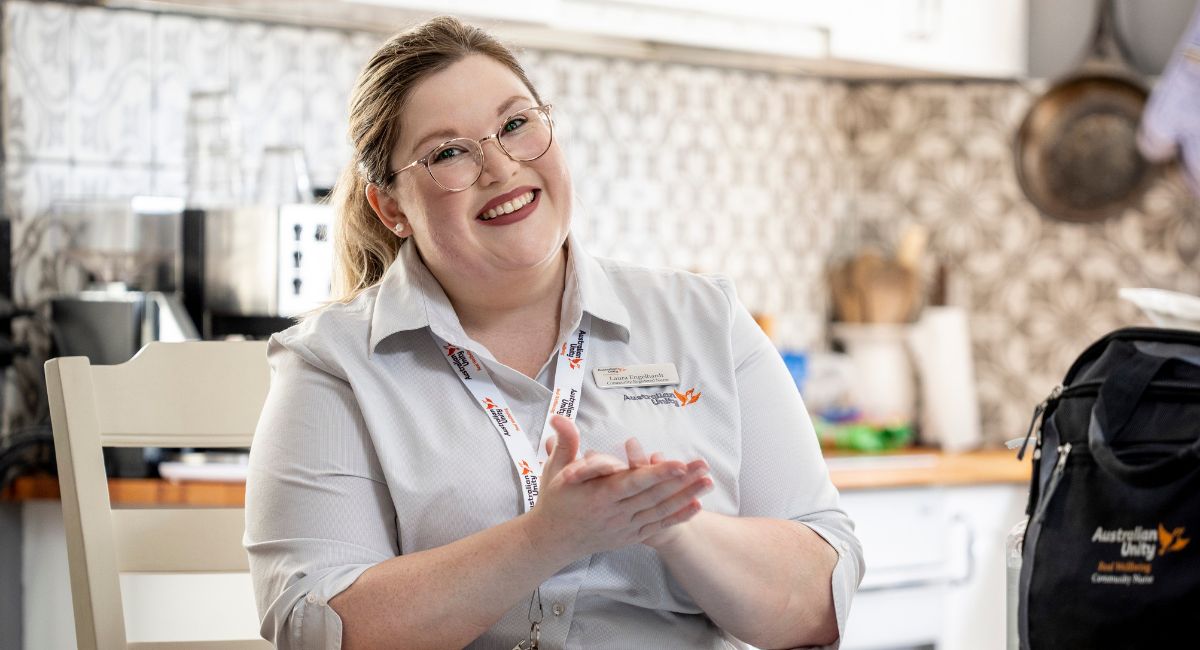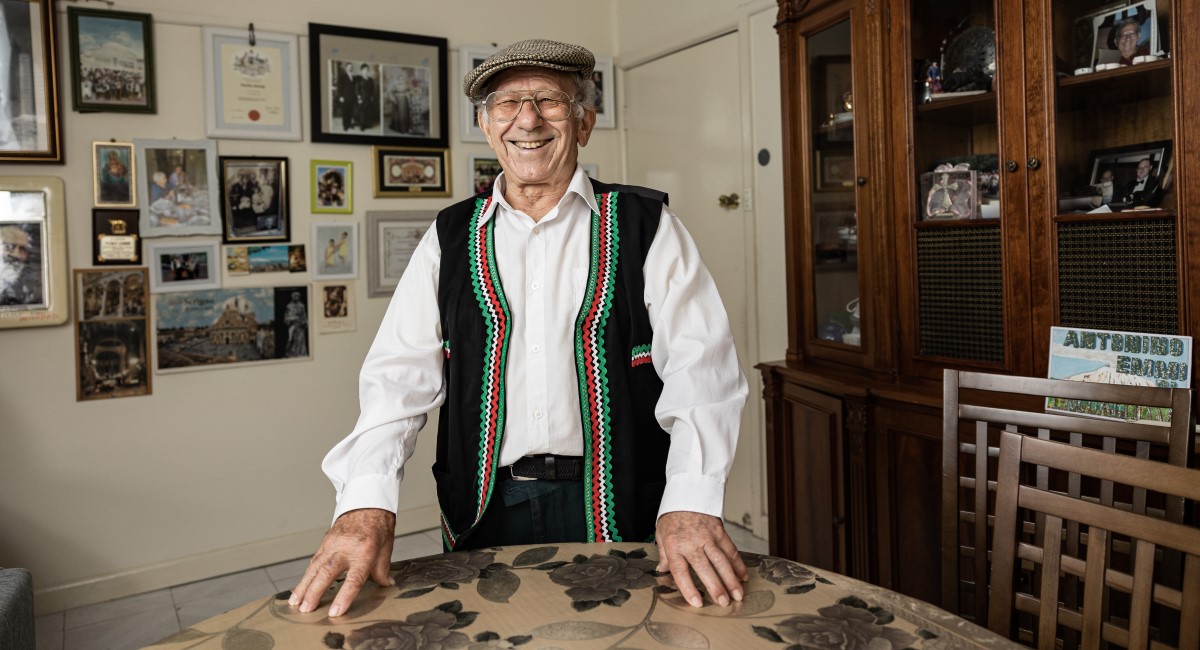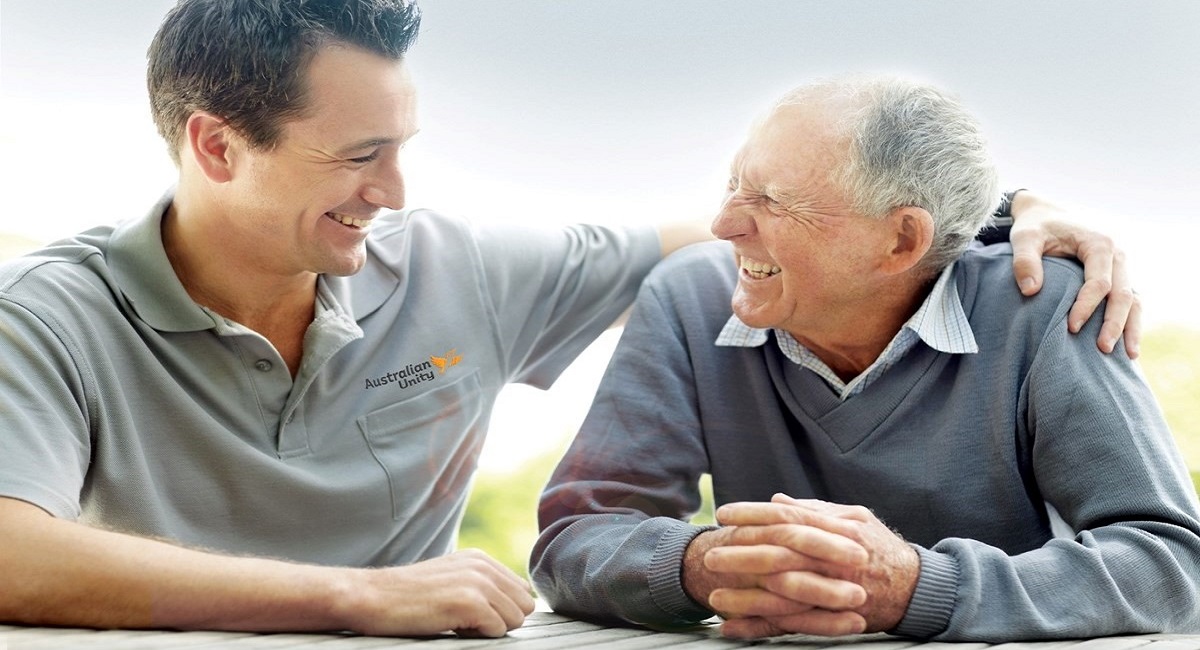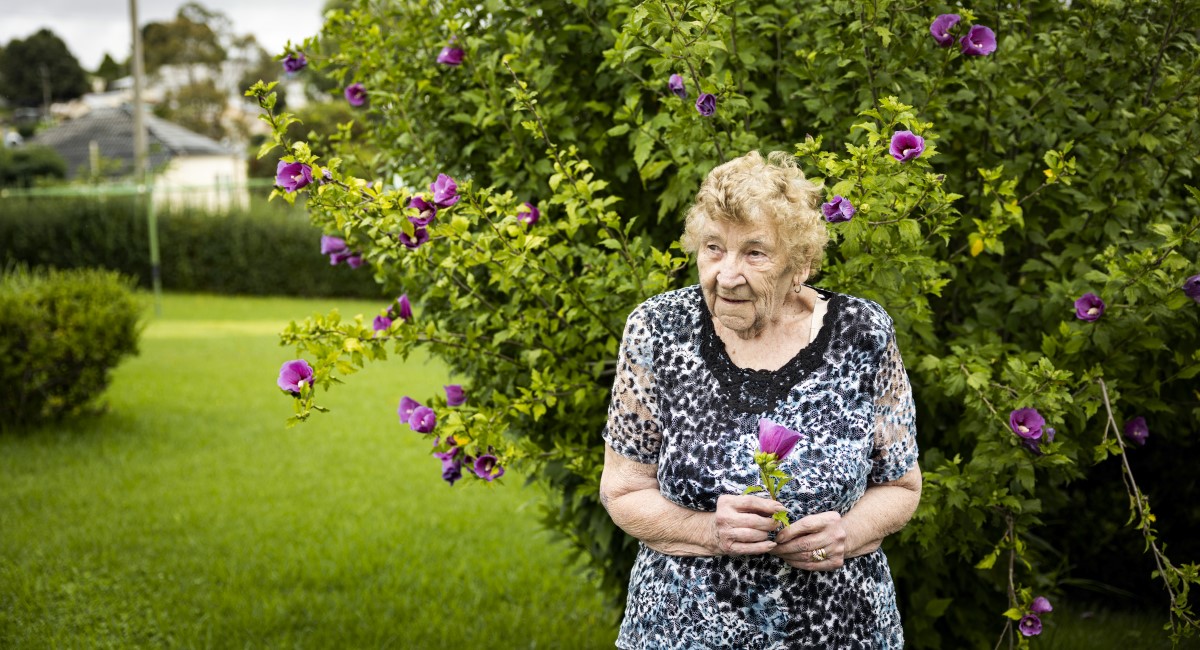“Their happiness and their wellbeing is at the forefront of everything we do.”—Laura Engelhardt, Community Nurse, Australian Unity.
Key points
- Get help managing ongoing illness, medications, pain management and wound care with nursing in the comfort of your own home.
- At Australian Unity, an assortment of care workers, administrators, allied health professionals and more work together to deliver quality care to customers.
- When you work as part of Australian Unity’s care team, you make a critical difference in the wellbeing of customers every day. View career opportunities available here.
Japanese writer Ryunosuke Satoro famously penned the phrase: “Individually, we are one drop. Together, we are an ocean.”
Such is the case at Australian Unity, where an assortment of care workers, administrators, allied health professionals and more work together to deliver quality care to customers.
When you think of your support team, care workers like Steve Ravese might initially come to mind. Based in the Tweed Heads region of New South Wales, Steve spends his days visiting customers in their homes, providing everything from domestic and shopping assistance through to social support.
.jpg)
What you might not realise is that Steve also works alongside a number of service coordinators, branch managers, community nurses and allied health professionals on a daily basis. “There is sometimes crossover when you visit a customer,” he says.
“There may be a community nurse there, checking them out or changing a wound, or someone from Australian Unity doing an assessment.”
Steve is also in regular contact with his local branch, whether to arrange rostering or to report any customer updates. “We’re the eyes and ears for the customers back to the office,” he says. “All our notes are checked and, if there’s anything that needs to be followed up, they act upon it or contact us for extra information.”
Prior to joining Australian Unity in March 2021, Steve had been a carer for both his parents, though had also pursued a range of other jobs, including running a garden centre and cafe. The loss of his job at an airport parking company during the pandemic – and conversations with other carers – inspired him to revisit his former profession. “When I spoke to people, they said caring is one of those things where it doesn’t matter what age you are,” he says. “I’ve done a lot of different things, including running businesses, and when you’re with a customer, these background experiences help you connect with them in a lot of ways.”
Like Steve, Laura Engelhardt, Community Registered Nurse, joined Australian Unity during the pandemic, in June 2020. “I’d left nursing to be a stay-at-home mum, then COVID-19 happened and I thought: I need to be using my experience and getting back out and helping people,” she says.
Working from Australian Unity’s Calare Branch, in New South Wales, Laura performs a number of roles. She does holistic assessments for customers and provides nursing support, such as wound care, catheter changes and medication assistance. She’s also involved with education programs, “upskilling our care staff and supporting our care worker coaches so they can be the best they can in their roles”.

Collaborating with others is a big part of Laura’s job. The nursing team regularly meets to share its experiences or to offer advice and support. She also works closely with the Service Coordinators and Branch Managers at Calare to maximise customer care; if, for example, someone has gone into hospital, they formulate a care plan together to ensure the customer’s comfort once they return home.
“Out in the community, if I’m doing one of my regular visits, I might come across a care staff member and they give me insights from their point of view,” she adds. “They’re with the customers day in and day out, so they see things, which all adds to the bigger picture.”
For Laura, this team approach ensures better outcomes for customers. “It means everybody is wanting to work towards the same goal for the customer,” she says. “Their happiness and their wellbeing is at the forefront of everything we do.”
Annette Fenton, an Australian Unity Project Officer, sees this same level of dedication among the staff who are involved with the social groups she runs through the Multicultural Respite Network (MRN). Annette has worked closely with these groups since 2011, when she first joined Home Care NSW (now part of Australian Unity).
Each week, Annette coordinates two Khmer groups, a Chinese group and a Middle Eastern group, who meet at the Cabra-Vale Diggers Club in Sydney’s Canley Vale. These sessions include a hot lunch and other activities such as guest speakers, movement classes and outings – all of which require a team of people to arrange. “There’s the logistics of organising community transport; getting the lunch orders through to the club; catering to everyone’s likes and dislikes; and managing cancellations,” she explains.
.jpg)
During the sessions, Annette is supported by care workers, including an Arabic-speaking care worker for the Middle Eastern group, Marina Sleiman; a Mandarin-speaking care worker for the Chinese group, Corina Kam; and representatives from the Cambodian-Australian Welfare Council of NSW, who help run the Khmer groups.
Given that all 116 MRN customers come from culturally and linguistically diverse backgrounds, Annette says it’s beneficial to work with team members who have a cultural understanding of the customers and where they’re from. “The customers relate to that and seem to be able to connect nicely to someone who knows the language, even if they’re not from the same country,” she says.
Connecting with customers is something Annette believes Australian Unity does well. “We build a rapport with them and they open up about things they need, and we then link them to other services or support,” she says. “That is part of the customer service experience we provide.”
Disclaimer:
Information provided in this article is of a general nature. Australian Unity accepts no responsibility for the accuracy of any of the opinions, advice, representations or information contained in this publication. Readers should rely on their own advice and enquiries in making decisions affecting their own health, wellbeing or interest. Interviewee names and titles were accurate at the time of writing.


